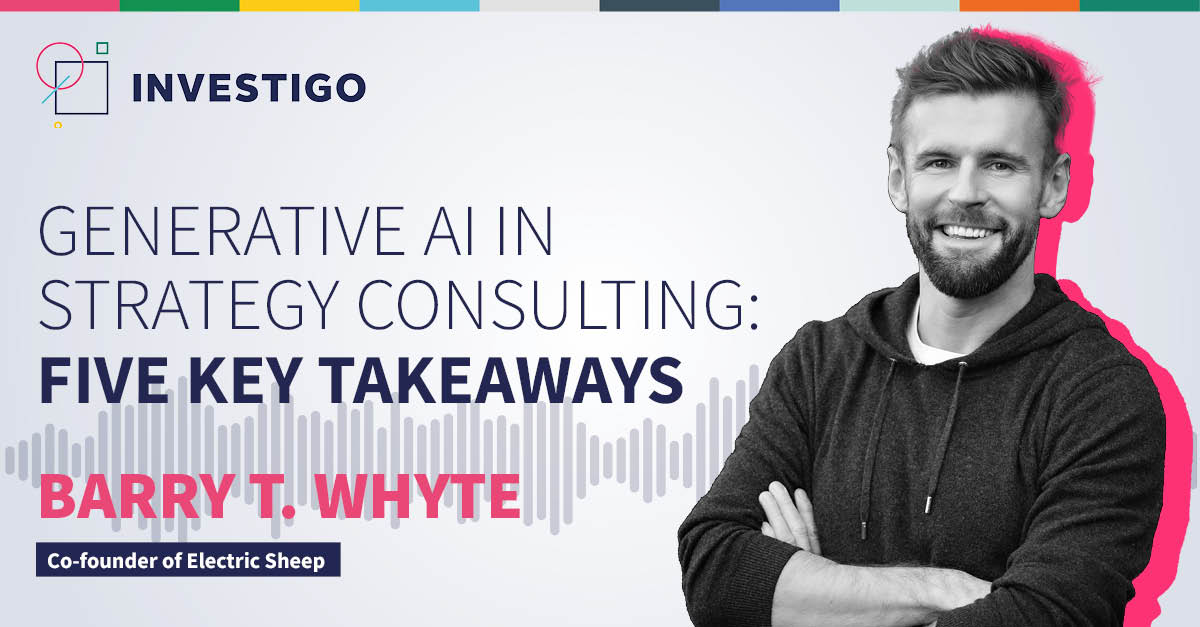
Generative AI in strategy consulting: five key takeaways with Barry T Whyte
Everyone seems to be talking about generative AI right now, but most business leaders still don’t know what it means for their organisation. In the first of our interim strategy bench interview series, Joe Siantonas, associate director of our global interim strategy team, caught up with Barry T Whyte, co-founder of AI training school Electric Sheep, to talk about how generative AI is affecting the consulting world. Here are the five key takeaways.
1. Productise to maximise
What’s the best way to go to market? Do you productise your approaches from the start, use a carbon copy of a previously successful process, or tailor your approach to every single client?
“You’ve got to productise it,” said Barry. “Quite simply, you don’t make money in the consulting world unless there is a layer of productisation.” This has the added benefit of helping you build IP. By delivering a service for a client and drawing out the key lessons, you’re making them available to the wider firm to use with other clients in a way that respects client confidentiality, in line with professional standards.
2. ChatGPT could write The Dark Side of the Moon – but not just yet
With AI capable of producing everything from screenplays to music (perhaps one day, an album as admired as Pink Floyd’s The Dark Side of the Moon) there’s a concern that even the most creative of human occupations are under threat. But Barry believes “There is still original content to be made. Humanity’s not exhausted every single last idea just yet, for sure.” In fact, he argues, “AI might force us to actually be a bit more innovative and think outside the box a bit more because that’s what humans are really good at.”
The interview itself was an example. We could have taken voice samples and photos of the participants, used video synthesis tools, written a script and then automated the conversation – but those things would have required human intervention. A live conversation between two humans proved to be the most favourable approach. How long that remains the case will be another matter.
3. AI can automate an entire marketing campaign
“I think we can pretty much do that today. All the component parts are right there to create a fully automated marketing campaign.”
Whether it’s video synthesis, voice synthesis, scriptwriting or hyper personalising scripts to a particular customer, AI can cover it. The possibilities from a marketing perspective are endless. Imagine a future scenario where a visitor logs on to your website and you speak to them directly through an automated representation of your voice. This will strengthen your engagement with your audience and increase the chance of conversion. The technology is there to make that happen. It’s just a case of stitching the various systems together.
4. We’re still finding out what AI can do
Despite the breadth of its capabilities, we’re still not seeing many organisations produce end to end personalised marketing campaigns with generative AI. But it won’t be long. “Hyper personalisation using gen AI I think will be the next big marketing trend to watch for. I think we’ve not seen that much of it to date, simply because it’s such a new technology.”
Most people only started to realise the potential of AI at the beginning of this year and are still getting their heads around the opportunities that it presents. Even those who created these systems are struggling to identify uses for them. The leading developers of large language models (LLMs), natural language processing programs that use artificial neural networks to generate text, struggled to work out how anyone was going to use them in the early days. But now people are finding uses for them.
“Thinking about hyper personalisation, the technology is there, but people are still very new to it. They’re still working out, not only what opportunities does it present for their business, but how do we integrate this into my existing workflows and how do I connect it to all of the other systems that I’m using?”
“I think hyper personalisation is the thing to watch.” Barry T Whyte
5. Slower businesses will get disrupted, rapidly
Large companies have slower processes and it therefore takes longer for them to change. This makes them vulnerable to small challenger brands, who can be much more agile, changing the game and taking their market share. Will we see direct to customer brands use hyper personalisation in the near future?
“I’m sure in three months’ time if we were doing this podcast, I’d probably have a bunch of case studies at my fingertips, but they just haven’t happened yet. But the technology’s there, so it’s just a matter of time. And like any technology, smaller players are just faster at adopting it.”
The way things are right now, it could be years before we see the big hitters start to successfully utilise AI. But with their greater agility and the pace at which they can adopt new technologies, the startups will very much be worth keeping an eye on.
From our interim strategy bench, we connect private equity businesses, corporates and consulting firms with a network of independent strategy and management consultants who can futureproof your business. If you’re a business leader looking for an expert to help your organisation utilise generative AI, find out more about our interim strategy bench here.


